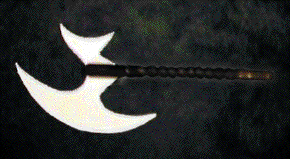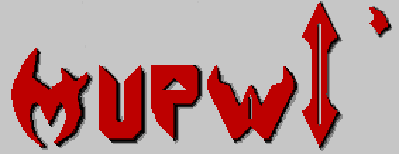

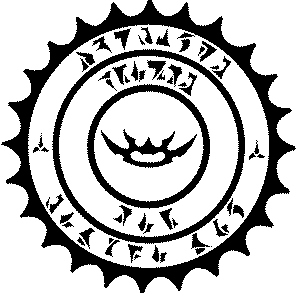
I welcome all of you who appreciate the seductive curves and radiant warmth of steel fashioned into the perfect Klingon blade - the betleH vaQqu' !! Whether you are fortunate enough to create your own custom weapons, aspire to learn the art or just want to associate with blade-smiths, *The Guild* is here to serve you and the Empire.
This month we have a couple of new sections that I think you will enjoy and hopefully become enthusiastic about. Be sure to provide me with any feedback on this or any other issue and also any ideas for sections you'd like to see in the *mupwI'*.
K'Beck has provided us with a *historical* account of the development of the meqleth which will appear later in this letter . K'Beck has also agreed to *persuade* his contacts in the Klingon Bureau of Information to provide us with the histories of as many of the edged weapons as they can. We will also start a series that takes us through one craftsman's routine for designing and producing an authentic *new* Klingon weapon.
mupwI' yI'uchtaH !! (Keep holding the hammer ! )
K'Daq son of
Toragh
Master of the Heart of Kri'stak

This month's letter to the editor has been developed into a new
section.......the Blade Histories section. This will be the responsibility of
K'Beck and as you will see, he has done a good job on the first installment. If
any of you have an interesting history tied to the development of a weapon,
please send it on to K'Beck or myself to be included in future
issues.
K'Daq

As the Guild grows, we will try to enhance camaraderie by publishing
histories of our members (both Klingon and Terran). It is not necessary to
develop a family history to be a Guild member, but it does help to solidify an
image of you as a fellow crafts person and Klin.
K'Beck writes.......I am from a Romulan prison camp. My Mother (whose name I
have promised to keep secret) was captured in the attack on Khitomer and after
taking a Romulan mate in the prison camp, I was the result of their union.I was
returned to Qo'noS with several others by Worf. Now I am learning the culture of
my home world. My father was against this and I will never reveal his name
either so as to protect his house on Romulas. I presently have no house that I
can claim, perhaps the house of Toragh will find me worthy? Or perhaps the House
SaqIm?
K'Beck you are more than worthy - there is always a place for you in the
House of Toragh if you desire it.
Next month: K'moghjIH

An excellent account of the ingenious nature of the warrior. Gowron himself
has said that a Klingon can always find a weapon. As for pictures, just attach
the file to your next e-mail and I'll get it up on the weapons site. I think it
would be a great help in letting others see how the Klingon warrior thinks.
As for my doctor......HAHAHAHAHAHAHA..........she has tried SOOO hard to cure
me..........I just felt she deserved an honorable death before I go to the Black
Fleet. I look forward to your next installment.
K'Daq

There is not much to add to K'Beck's accounting. The meqleH saw a lot of
action on DS9 shortly after Worf transferred there. Its a much more practical
weapon for him to carry - owing to its size. As the great blade master HetaQ has
said " You should never allow a weapon to give you a false sense of security". A
weapon should be an extension of your natural fighting ability. Worf proves this
with his fluid use of the small but powerful meqleH.
Once again I used quarter inch stainless for the weapon because of the
*strength* and solid feel it gives the blade. The main blade is beveled along
it's entire perimeter. The blocking blade or guard is beveled on the tip but is
left rounded along its lower edge - and obviously rounded on it's inner
edge.
Rather than wrap leather strips around a flat handle, I created a hidden tang
and formed the handle from leather washers that were *hardened* and shaped. (see
this month's tip section) This allows for a custom forming of the grip and a
very comfortable weapon to hold. The pommel is half inch stainless threaded ,
shaped and screwed to the end of the hidden tang.
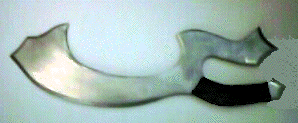

In medieval times leather was soaked in carnauba wax (a very hard substance)
and this produce a material that was (while hot) supple and moldable. After it
cooled the material was incredibly strong, hard and resistant to weapons
attacks. This was the basis for early armor plate.
To create a hardened leather handle it is best to start with a hidden tang.
You want a good thickness of leather to surround the tang (at least .25 inches)
but you also want as much strength from the steel as possible. You cut out a
number of leather *washers* and punch holes in the center of them that
correspond to your tang's cross section. These washers can be oval (to
approximate your final handle cross-section) or you can leave them rectangular.
You're going to be trimming the final handle to custom shape it and I find that
it is creates more work if you try to pre-cut the washers to final shape. If you
cut rectangles you can lay it out on a band saw and knock out several dozen in a
few minutes. The tang can be threaded for a pommel to be placed or you can use a
pinned on pommel, whichever method you are used to. The threaded pommel does
have one advantage in that it allows you to compress the leather washers one
final time and get an even denser handle.
I usually fit a steel or horn guard to the junction of the tang and blade to
act as a base for the leather and then I use 2-ton epoxy to secure the washers.
This epoxy is water proof and has a long setting time so you can easily place
all the washers in one sitting. After the last one is on, screw your pommel on
tight (or pin it) and set it aside to harden. When the epoxy has hardened,
roughly grind the leather to shape just like you would any other handle
material. Come close to the final shape but do not grind to the final shape.
Allow yourself a sixteenth of an inch or so.
Now get a can of lacquer and warm it up. Lacquer is flammable, so take care
how you perform this step. I live in Houston and I usually just set the can on
the driveway in the sunshine (or on the slopes of Kri'stak if I'm visiting If you have carnauba wax and want to substitute it for the lacquer, go for
it. Let me know how it comes out. I hope you have as much success with this as I have. Qapla'! The first step in producing a weapon is to have good reference material. Many
pictures from books, movies or series episodes are essential. In this case we
are going to invent a new weapon and therefore no such material will be
available. The first step (and the subject of this installment) will be to
design our own weapon using elements common to Klingon weapons. The Mok'bara or Klingon fighting style requires weapons that have a certain
*flowing* quality to them. In all of the blades seen there is always a scimitar
like shape. You rarely see straight edges accept in small knives. In a study of
similar cultures who used edged weapons there is always an axe or axe-like
implement. The feudal Japanese who the Klingons are most often compared to used
several types of axes for tools and for weapons. With the right type of design,
this style of weapon could be quite formidable in the hands of an accomplished
Klingon Warrior.According to Okrand the traditional Klingon warrior's arsenal
included the ax, an implement with heavy, flattened blade mounted crosswise at
the end of a handle. The general term for ax is 'obmaQ. Its handle is its DeS
and its blade is its ghIt. (Okrand's Klingon for the Galactic Traveler) For the primary blade I chose a shape similar to the bat'leth's main blade.
The sweeping arch will enhance the natural moves of the Mok'bara. In order to
keep the weight of the weapon down the blade itself was given a thin profile and
this portion of the axe is offset to place the cutting edge of the blade in the
same alignment as the bat'leth's main blade when held in one hand. The secondary or rear element of the axe uses the ancient lines of the Sword
of Kahless. I felt this design element would lend itself to the fact that this
was an ancient weapon of the *pre-space* Klingon Empire and would qualify as an
*heirloom* weapon. It creates a large blocking element at the head of the shaft
and a smaller one directly behind the center of gravity of the main blade and
shaft. This rear element also provides a very destructive blade for
counter-strikes. The blade will be secured to it's handle (DeS) by resting it in a quarter
inch slot with the added stabilization of a short partial tang made with a
quarter inch extension of the blade pattern. The entire blade assembly will be
pinned and then decoratively wrapped in the final steps. Next month we'll talk about choosing the material for the handle or DeS and
how to *dress* it up to honor our heirloom weapon and create a true 'alngegh
vaQqu' !! Remember to write with any material you'd like to have discussed or placed in
*mupwI'* .. mupwI' yI'uchtaH !! K'Daq

Klingon Battleaxe or 'alngegh
(from Okrand's Klingon for the Galactic Traveler)
In this issue we will be starting a series in which we go through all the
steps in designing and producing an authentic Klingon style weapon.
The combination of the single axe blade with a
secondary blade or spike at the end is called a 'alngegh while a two bladed axe
is referred to as a jey'naS (Okrand's Klingon for the Galactic Traveler)
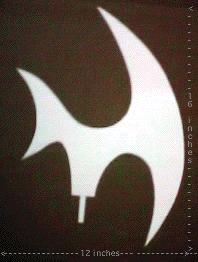
ghIt (Blade)
